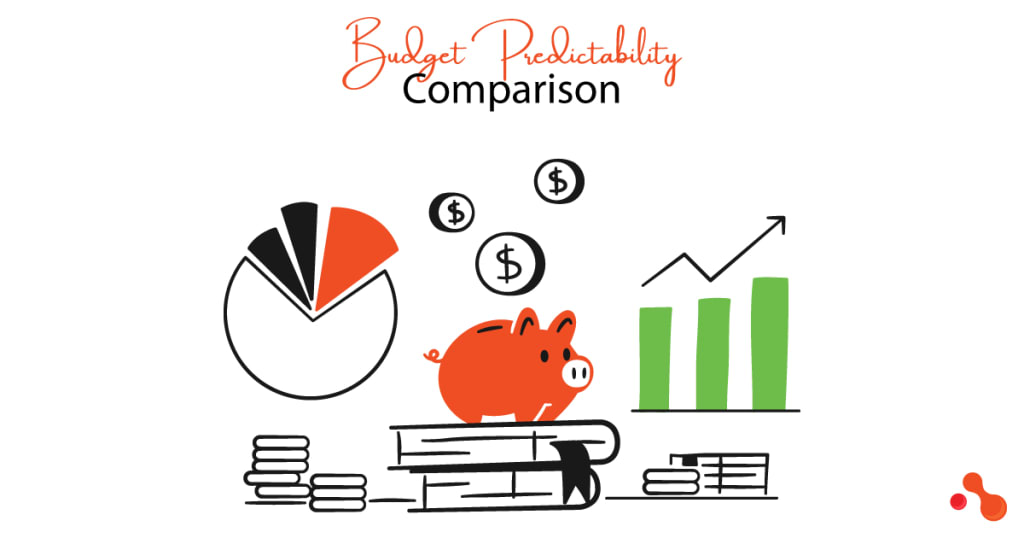Comparing Budget Predictability - Development Team & Client
Perspectives of developers & clients for software budget

Introduction
Software budget overruns are a common challenge in the software development industry, often resulting in projects exceeding their allocated financial resources. These overruns can stem from a variety of sources and are viewed differently by various stakeholders involved in a project. Understanding these perspectives is crucial for managing expectations, improving budget predictability, enhancing project outcomes, and mitigating financial risks.
Understanding and reconciling the various perspectives of budget predictability is an excellent insight to manage your budget better. Successful organizations often integrate insights from multiple viewpoints to enhance their overall budgeting processes and outcomes.
Predictability and control in budget execution play a crucial role. Different stakeholders, ranging from project managers and developers to clients and upper management, hold diverse perspectives on what influences the predictability of the budget and how to achieve it. This article sheds some light on various perspectives.
What is Budget Management?
Budget management is the process of planning, organizing, monitoring, and controlling financial resources within an organization or for a specific project. It involves creating a comprehensive plan that outlines expected income and expenditures and then overseeing the implementation of that plan to ensure financial goals are met.
Budget management is a crucial aspect of financial planning and control, contributing to the overall success and stability of an organization. Here are the key components of budget management:
Budget Planning
Resource Allocation
Expense Monitoring
Income Tracking
Budget Control
Variance Analysis
Risk Management
Communication and Reporting
Strategic Alignment
Continuous Improvement
Legal and Regulatory Compliance
Flexibility in Budgeting
Importance of Budget Predictability
Budget accuracy holds significant importance for organizations across various sectors. Here are key reasons highlighting the importance of predictability of budget.
Contributes to financial stability by allowing organizations to plan and allocate resources effectively.
Help prevent financial crises, ensuring that expenditures align with income streams.
Enable efficient resource optimization.
Provide a foundation for strategic planning.
Organizations can identify potential risks and develop strategies to mitigate them.
Instill confidence in stakeholders, including investors, clients, and employees.
Building trust and credibility, fostering positive relationships with key stakeholders.
Enhance operational efficiency, allowing them to plan and execute projects without disruptions caused by unexpected financial challenges,
Provides a solid foundation for decision-making.
A very good example of a budget overrun issue:
The California High-Speed Rail project, intended to connect major cities in the state, experienced significant budget overruns. Initial estimates of around $33 billion increased to over $100 billion due to changing plans, legal challenges, and funding issues.
A similar cost overrun issue was that of a software project for Integrated Computer Services. This project had an issue of scope creep that eventually led to cost overrun. The firm had to cancel the project.
Development Team's Perspective
The software development team will typically mean the project manager and the development team. However, in the case where the requirements are outsourced, it can also mean the management team of the software development company. Hence, here are the perspectives of predictability of budget of the project manager, development team, and the upper management:
Project Manager's Perspective:
Project managers are on the front lines, directly dealing with the consequences of budget overruns. From their standpoint, overruns are often a symptom of deeper issues within the project management process, including:
Inadequate Planning: Insufficient analysis during the planning phase can lead to unrealistic budgets that do not account for all potential costs.
Scope Creep: Uncontrolled changes or continuous growth in project scope without equivalent increases in budget or timelines.
Risk Management Failures: Inadequate identification, analysis, and mitigation of risks that could impact the budget.
Project managers view budget overruns as challenges that require immediate attention and resolution through better planning, stakeholder communication, and scope management.
Developer's Perspective:
Developers may have a different view of budget overruns, often attributed to:
Underestimation of Complexity: The technical complexity of tasks can be underestimated, leading to more time and resources being required than initially planned.
Changing Requirements: Frequent changes in project requirements can lead to rework and additional development time, impacting the budget.
Technical Debt: Accumulated technical debt from previous projects or phases can slow down development, requiring extra effort to address.
For developers, budget overruns might highlight the need for better requirement analysis, more realistic time estimations, and improved technical planning.
Upper Management's Perspective:
It's including executives and senior leaders within the organization undertaking the project, views budget overruns through the lens of overall business impact:
Financial Health: Concerns about how overruns affect the company's financial status, potentially eating into profits or diverting funds from other strategic initiatives.
Reputation Risk: The potential damage to the company's reputation if it becomes known for exceeding budgets and failing to deliver projects as promised.
Strategic Implications: Considerations on how budget overruns impact the organization's ability to compete, innovate, and grow in the long term.
It also focuses on systemic solutions to prevent budget overruns, such as improving project governance, enhancing financial controls, and fostering a culture of accountability.
Client's Perspective
Clients or stakeholders financing the software project are primarily concerned with receiving value for their investment. They perceive budget overruns as:
Lack of Control: A sign that the project team lacks control over the process and is unable to deliver within the agreed financial constraints.
Reduced Trust: Budget overruns can erode trust between clients and service providers, as clients may feel that their interests are not being adequately protected.
Questionable ROI: Concerns arise about the return on investment, especially if overruns are significant and the benefits of the project are not proportionately higher.
Clients typically demand transparency, regular updates, and justification for any additional expenditure, expecting measures to prevent future overruns.
Key Differences of Perspective
The perspectives of clients and developers on budget overruns in software projects can differ significantly. This is mainly because of their distinct roles, interests, and priorities. Here are key differences in how clients and developers may perceive and experience budget overruns:
Primary Concern:
Client Perspective: Clients are primarily concerned with the overall project cost and staying within the agreed-upon budget. They expect the software to be delivered on time and within the financial constraints outlined in the initial agreement.
Developer Perspective: Developers are concerned with delivering a high-quality product that meets the client's requirements. While they acknowledge budget constraints, their primary focus may be on ensuring that the software is technically sound and meets the desired standards.
Financial Impact:
Client Perspective: Clients experience budget overruns as a direct financial impact on their investment. Overruns may lead to increased project costs, potentially affecting the overall profitability and return on investment.
Developer Perspective: Developers may see budget overruns as a challenge to project resources and timelines. They fully understand the financial implications. But their main focus may be on finding solutions to technical challenges or accommodating additional client requests within the existing budget.
Trust and Satisfaction:
Client Perspective: Budget overruns can erode trust and satisfaction for clients. They may perceive overruns as a failure in project management, potentially leading to strained client-developer relationships.
Developer Perspective: Developers may view budget overruns as a consequence of evolving project requirements, unforeseen technical challenges, or external factors. They may prioritize maintaining a positive client relationship by addressing concerns and finding solutions to meet client expectations.
Scope Changes:
Client Perspective: Clients may attribute budget overruns to changes in project scope. They expect developers to adhere to the initially agreed-upon scope and may view additional features or modifications as a cause for increased costs.
Developer Perspective: Developers recognize that changes in project scope can contribute to budget overruns. They may emphasize the importance of clear communication regarding scope changes and the potential impact on the budget.
Risk Perception:
Client Perspective: Clients often view budget overruns as a risk to their financial investment. They expect developers to manage and mitigate risks effectively to avoid unexpected cost increases.
Developer Perspective: Developers acknowledge the inherent risks in software development, including technical challenges and changing requirements. They may perceive budget overruns as a consequence of navigating these risks and may prioritize proactive risk management.
Communication and Transparency:
Client Perspective: Clients value transparent communication regarding budget status, potential overruns, and the reasons behind them. Lack of communication or surprises related to budget issues can lead to dissatisfaction.
Developer Perspective: Developers may prioritize transparent communication but may also emphasize the need for clients to understand the complexities of software development. They aim to keep clients informed about challenges and adjustments to the budget.
Project Success Criteria:
Client Perspective: Clients often define project success based on adherence to the budget and timely delivery. Budget overruns may lead to a perception of project failure.
Developer Perspective: Developers may define project success based on technical achievements, quality of the delivered product, and client satisfaction. They may view budget overruns as challenges to overcome in achieving overall project success.
Understanding and addressing these differences in perspective is crucial. This is key to fostering effective communication, managing expectations, and maintaining positive client-developer relationships in the face of budget overruns.
Collaborative efforts to find solutions and align priorities can help mitigate the impact of overruns on both parties.
Benefits of Budget Predictability
Predictability of budget in software projects is a cornerstone of successful project management, financial planning, and stakeholder satisfaction. Achieving a predictable budget not only mitigates financial risk but also provides a host of benefits that extend across the entire project lifecycle and beyond. Here are some key advantages:
Improved Planning and Resource Allocation
Enhanced Stakeholder Confidence
Reduced Financial Risks
Better Decision Making
Increased Project Success Rates
Enhanced Reputation
Facilitates Continuous Improvement
Why Outsource Software Requirements?
Hire remote developers to ensure greater accuracy in the software budget. Acquaint Softtech offers a wide range of software development services to clients all over the globe. We have developed over 5000 projects successfully and have over 10 years of experience.
We have a dedicated team of developers with skills in a wide range of technologies. This is the ideal place to either outsource our requirements or opt for IT staff augmentation.
Conclusion
Budget overruns in software projects are a multifaceted issue, viewed differently by various stakeholders. Each perspective offers valuable insights into the causes and potential solutions for managing overruns effectively.
By understanding these viewpoints, organizations can adopt a more holistic approach to budget management. They can incorporate a comprehensive plan, clear communication, and robust risk management strategy to minimize overruns and ensure project success.
Recognizing and addressing the concerns of all stakeholders involved is key to achieving better financial control and delivering projects that meet both expectations and budget constraints.
FAQ
What is software budget predictability?
Software budget predictability refers to the ability to accurately forecast and control the financial aspects of a software development project. It involves creating a budget plan that outlines expected income and expenditures, monitoring and controlling expenses, and aligning financial resources with the project's goals in a predictable manner.
Why is software budget predictability important?
Software budget predictability is crucial for financial stability, resource optimization, and effective decision-making. It helps organizations plan, allocate resources efficiently, and make informed decisions, fostering trust among stakeholders and contributing to the success of the software project.
How do project managers perceive software budget predictability?
Project managers view software budget predictability as essential for effective project planning and control. They emphasize the need for accurate estimations, risk management, and continuous monitoring to ensure that the project stays within the defined financial constraints.
What is the impact of software budget predictability on stakeholders?
Stakeholders, including clients and investors, benefit from software budget predictability as it instills confidence in the project's financial management. Predictable budgets contribute to trust, satisfaction, and positive relationships with stakeholders, fostering long-term collaborations.
Can software budget predictability be impacted by external factors?
Yes, external factors such as changes in technology, market conditions, or regulatory requirements can impact software budget predictability. Organizations need to stay informed about external influences and adapt their budgets accordingly to maintain predictability.
About the Creator
Mukesh Ram
I founded Acquaint Softtech Private Limited with a vision to make quality developers affordable to everyone. With my blood, sweat, and tears I haven’t just been able to sustain but thrive over the years.
Enjoyed the story? Support the Creator.
Subscribe for free to receive all their stories in your feed. You could also pledge your support or give them a one-off tip, letting them know you appreciate their work.






Comments
Mukesh Ram is not accepting comments at the moment
Want to show your support? Send them a one-off tip.